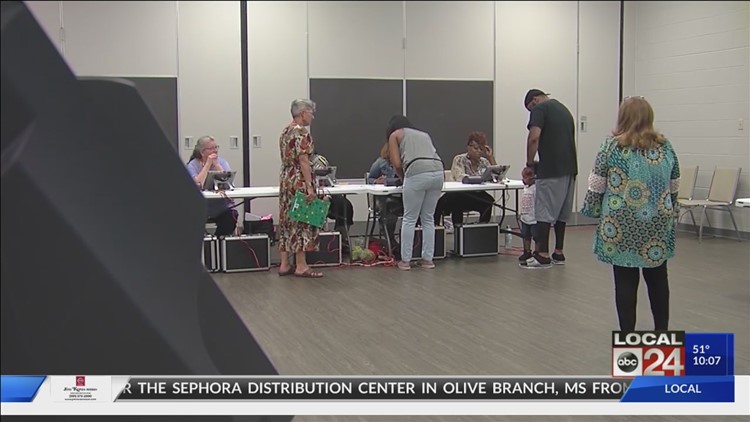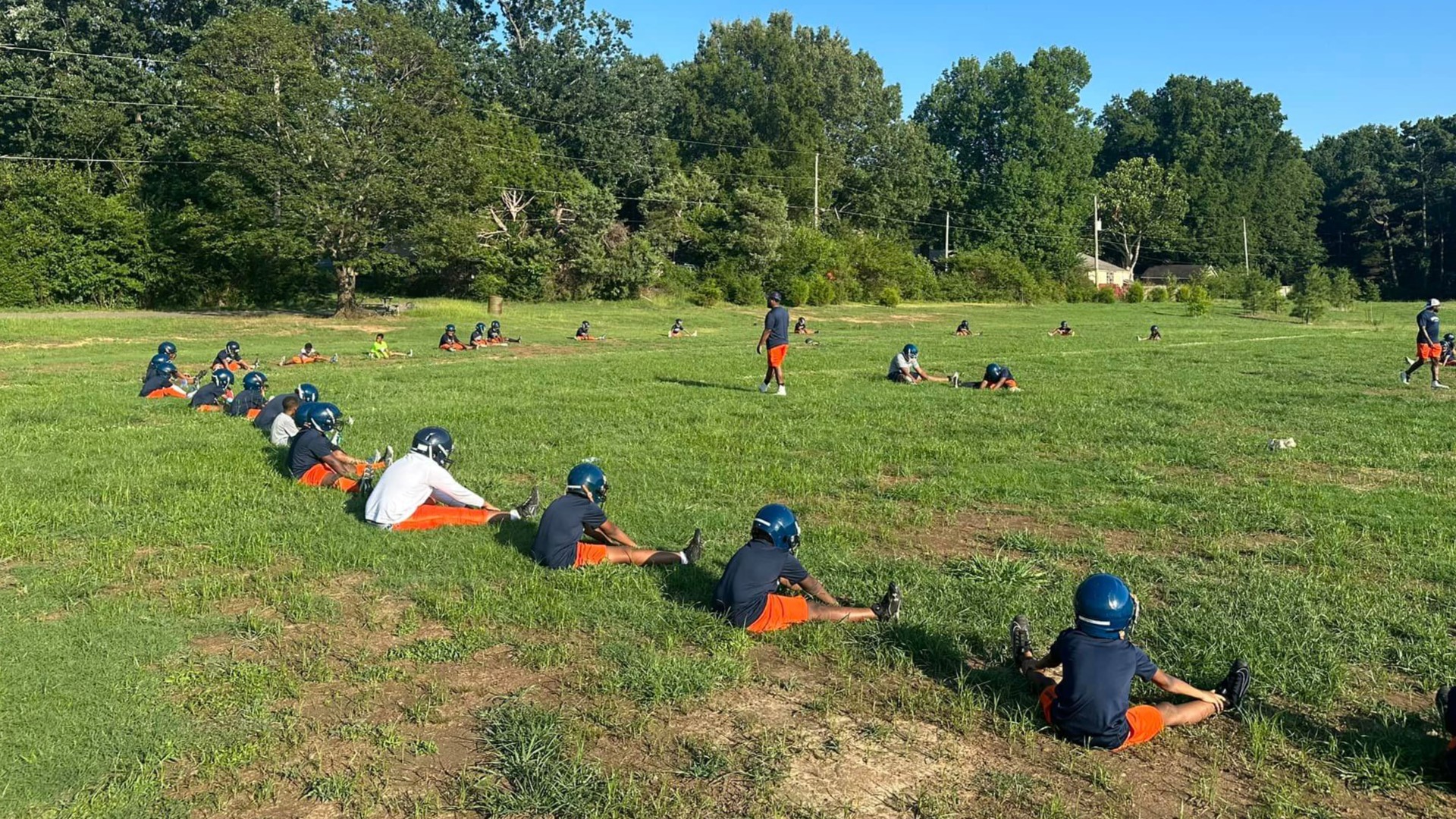A lawsuit has been filed over voter registration and alleged voter suppression in Shelby County.
The NAACP sent Local 24 the following release regarding the lawsuit:
The National Association for the Advancement of Colored People (NAACP), America’s foremost civil rights organization, announced today that its Memphis Branch filed suit yesterday against the Shelby County (TN) Election Commission for its refusal to allow voters who submitted timely, but allegedly deficient, voter registration applications to correct any deficiencies in those applications on or before Election Day and then vote regular ballots. Co-plaintiffs in the lawsuit are the Tennessee Black Voter Project and individual plaintiffs who were harmed by the defendants’ actions.
“It doesn’t matter when or how voter suppression happens, the NAACP remains steadfast in its commitment to challenge it,” said NAACP President Derrick Johnson. “The integrity of our democracy rests on our ability to protect the vote in Tennessee and other states around the nation where forces seek impinge on our constitutional right to vote.”
Under Tennessee law, anyone filing a timely voter registration application must be notified whether the application was accepted or rejected. If the application is rejected, the voter must be allowed an opportunity to cure the alleged deficiency on or before Election Day and then cast a regular ballot. The Shelby County Elections Commission rejected a large percentage of voter registration applications submitted by the Tennessee Black Voter Project following a massive voter registration campaign in African-American communities. While grudgingly recognizing its obligation to allow voters whose applications were rejected an opportunity to cure the alleged deficiencies at early voting locations and then cast a regular ballot in early voting, the Elections Commission has thus far refused to commit to follow the same procedure on Election Day. Its plan to require such persons to vote provisional ballots not only violates the express terms of the governing statute, but also threatens to disenfranchise thousands of African-American voters whose registration applications were timely submitted but rejected at alarmingly high rates.
The NAACP’s request for curing at the polling station on Election Day is precisely what the County is doing now for early voters, after strong prodding from the plaintiffs. In addition to a curing opportunity and the voting of regular ballots on Election Day, plaintiffs are asking that the Elections Commission provide the legally required notice to everyone who submitted a timely voter registration application, and further, that the Elections Commission provide the plaintiffs with a list of all persons whose timely applications were rejected.
“It’s a simple, we want Shelby County to allow eligible persons who are those seeking to vote to be able to do so,” said NAACP General Counsel Bradford M. Berry. “Tennessee’s laws clearly require notice and an opportunity to cure and vote a regular ballot on Election Day, not the ‘easy out’ of a provisional ballot that might never be counted.” Recently, the NAACP Georgia State Conference joined a suit seeking to protect the right to vote of 53,000 individuals whose voter registration applications remained unprocessed by Georgia Secretary of State Brian Kemp, who is a candidate for Governor and who has expressed concern about the “Get Out The Vote” operation of his African-American female opponent, Stacy Abrams.
The Shelby County Election Commission sent Local 24 this response to the lawsuit Tuesday:
Earlier today the Tennessee Black Voter Project (TBVP) filed an amendment to its lawsuit against the Shelby County Election Commission (SCEC).
The amendment contains a number of baseless allegations, including intentionally not processing some of the thousands of voter registration applications dumped on SCEC immediately preceding the Oct. 9 deadline.
“To the extent there is a problem, it is one created by the TBVP,” said Linda Phillips, administrator of elections “It certainly appears that they intentionally withheld the forms until the deadline in an effort to create chaos.”
Many of the applications submitted were duplicate applications. Yet other forms were incomplete.
Thousands of rejected applications were submitted by convicted felons who have not had their voting rights restored. “It is a State Law. There is a process, which begins with forms available through the court system, by which felons may have their voting rights restored, and we have given sessions on how to do this at public libraries, and in other places. The voting right restoration process is also outlined clearly on our website.”
Another point in the amendment addresses is forms that are considered incomplete because the salutation selection has been omitted. Tennessee State law requires gender identification as it is part of the process of identifying a voter at the polling location. The registration forms used by SCEC, the State issued form, makes clear the requirement for gender identification. TBVP chose to use a different version of the form.
Months ago, when representatives of TBVP talked to officials at SCEC about its voter registration efforts, SCEC offered to buy the group WiFi-enabled tablets to register people. Using them would not only have made the registration process faster, but the tablets would not allow the submission of deficient applications. TBVP refused the offer.
Another demand is that SCEC create a process to allow those with incomplete applications to cure the deficiencies and allow them to vote on a machine. There is already a system in place and it is working.
When someone appears, who has an unprocessed application, one with a deficiency, or the person’s name does not show up in the state system, the poll worker calls a specially designated help desk number at the Ops Center. The person’s name is looked up ether manually or on the central computer at the Ops Center. Once located, the person is given the opportunity to cure the deficiency and the registration form is processed immediately. The voter is sent to a machine to vote. This process will continue through the end of Early Voting.
As of yesterday, out of nearly 60,000 early voters, 73 of them had cast provisional ballots.
On Election Day, people whose applications contain deficiencies will be required to vote on provisional ballots by directive of the Coordinator of Elections, Mark Goins.
Phillips said there is a simple explanation. “As a practical matter, polling places are not connected, and there would be no way for one polling place to convey to others that a person has already voted.” Phillips said. “
All remaining forms are due for completion prior to Election Day, Nov.6.
Another issue raised is the open records request submitted on Oct. 5.
“Of course, we comply with these requests. However, as stated on the web site, during an election cycle, there may be a delay in fulfilling these requests,” Phillips said. “To expect immediate response to a request submitted less than two weeks prior to early voting is unrealistic.”



